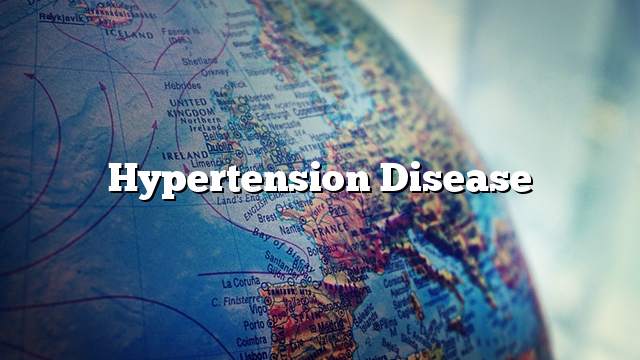blood pressure
Blood pressure is the pressure inside the arteries, which is responsible for blood flow through circulatory systems throughout the body, and expressed in two values: one called the diastolic pressure, and the other systolic pressure, and it must be noted that the value of the change due to several factors, Health problems, and in this article we will introduce you to the disease of high blood pressure.
Hypertension disease
Hypertension is continuously higher than normal in rest, affecting body functions.
Causes of high blood pressure
- Some diseases, such as urinary tract diseases, kidney disease, endocrine disorders, nodular arteritis, or high blood calcium.
- Hormonal problems resulting from taking pregnancy pills.
- Neurosis.
- Pregnancy.
- Hyperthyroidism.
- Adrenal gland disorders.
Stages of hypertension
- Pre-hypertension: Where systolic blood pressure is between 120-139 mmHg, and the diastolic range is between 80-89 mmHg.
- The first stage of high blood pressure: Systolic pressure ranges between 140-159 mmHg, and the diastolic pressure ranges between 90-99 mmHg.
- Second stage of hypertension: Systolic blood pressure is about 160 mmHg or higher, or diastolic pressure is 100 mmHg.
Factors that increase blood pressure
- Genetic factors.
- Eat a large amount of salts.
- Obesity.
- Smoking.
- Drink plenty of alcohol.
- Lack of exercise.
Symptoms of hypertension
- Feeling dizzy.
- General fatigue.
- Feeling.
- Throbbing
- Blurred vision.
- Headaches.
- The appearance of blood in the urine.
- Fainting in some cases.
- Buzz in the ear.
Complications of hypertension
- Heart disease, because it leads to hypertrophy of the muscular wall of the heart and increase its thickness.
- Arteriosclerosis.
- Some kidney problems, such as renal fibrosis, kidney failure.
- Some visual problems, such as vision disorders, and sometimes blindness.
- Strokes, coma and death in some developed cases.
- Memory problems.
- Angina pectoris.
- Metabolic syndrome.
Diagnosis of high blood pressure
- Take the family history of the casualty, and examine his pressure on several sessions.
- Perform some tests, such as imaging the kidneys using colored dye, and know the proportion of hormones in the urine and blood.
- Adrenal gland examination, ultrasound kidneys, and MRI.
Treatment of hypertension
- Reduce weight.
- Eat low-fat foods, and unsaturated fats.
- Eat low amounts of salt.
- Regular exercise 30 minutes a day.
- Stay away from smoking.
- Avoid alcohol.
- Stay away from the causes of psychological stress.
- Sleep enough time.
- Check with your doctor regularly.
- Commitment to timely medication.
